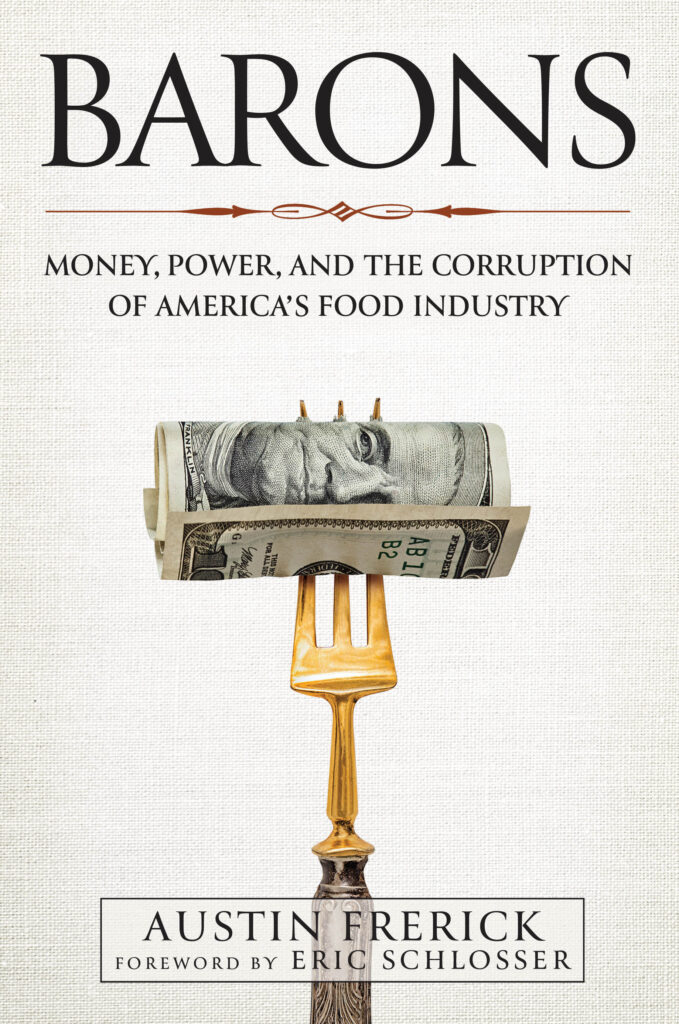Austin Frerick is the author of the book Barons: Money, Power, and the Corruption of America’s Food Industry, out later this month, which explores the powerful corporations that monopolize entire sectors of the U.S. food system: from pork, beef, and dairy, to grains, coffee, berries, and grocery stores. In his book, Frerick illuminates the ugly underbelly (or, perhaps, “reality” is a more apt word) of American agriculture—sprawling concentrated animal feeding operations (CAFOs), rivers of manure, life-threatening work environments, ever-rising consumer prices, and the individuals and government officials who facilitate and compound these conditions. As a seventh-generation Iowan who works in agricultural and antitrust policy, Frerick is better positioned than most to examine and critique these issues. Frerick’s mother owned a local coffee shop and his grandfather worked in a slaughterhouse at a time when they provided well-paying, middle-class jobs. Growing up in Cedar Rapids, Cargill, the largest private company in America, literally loomed over Frerick’s life: the company’s grain elevators rose above his church, his school, and his home. (As a fellow Iowa native who grew up in Des Moines, I can relate!) The harms caused by industrial agriculture in his home state led Frerick to pursue a career in agriculture antitrust policy. Frerick has worked at the U.S. Department of Treasury, the Congressional Research Service, and Open Markets Institute, and he has also previously served as an agriculture antitrust advisor to President Joe Biden, Pete Buttigieg, Bernie Sanders, and Elizabeth Warren.
I recently caught up with Frerick to discuss his new book, the “barons” of agriculture, and how the American food system has transformed from one defined by robust competition, including small farms and local businesses, to one dominated by monopolists.
Austin, thanks for taking time to interview with The Sling! You recently published your book Barons, and I am curious what made you want to write this book?
I got the idea to write this book back in the spring of 2018. Over Busch Lights at the dive bar Carl’s Place in Des Moines, an Iowa political operative told me about a couple who had recently donated $300,000 to Republican Governor Kim Reynolds in support of her campaign for reelection in a hotly contested race against Democrat Fred Hubbell. According to the operative, the donors were hog farmers who owned a private jet emblazoned with the phrase “When Pigs Fly.”
I just found this image to be such a powerful example of what happened to Iowa over my life: the power of robber barons in the food system has overrun the state’s government to the detriment of its environment and its communities. My curiosity led me to co-write an article about the Hog Barons in Vox. But as I dug into their story, I realized that they’re just part of a bigger trend that has transformed the food system in places across the country and beyond. I wrote this book as an attempt to grapple with how that happened.

In your book, you focus on the “barons” of various agricultural industries. Why did you decide to structure the book the way you do?
Each chapter is built around both a baron and a key concept. I first figured out the key ideas I wanted to touch on in the book and then worked backwards to figure out which baron best encapsulates each idea. For example, the Berry Baron chapter is really about the outsourcing of America’s produce system. I used the story of Driscoll’s to explain how this happened and what it means for farmworkers.
Likewise, I tell the story of JAB Holding Company, which is owned by a secretive German family that took over the global coffee industry in less than a decade by gobbling up countless independent companies using wealth traced back to the Nazis. You probably haven’t heard of JAB, but I promise that you’ve heard of their brands: Peet’s Coffee, Caribou Coffee, Einstein Brothers Bagels, Bruegger’s Bagels, Manhattan Bagel, Noah’s NY Bagel, Krispy Kreme, Pret A Manger, Insomnia Cookies, Panera Bread, Stumptown Coffee Roasters, Intelligentsia Coffee, Green Mountain Coffee, Trade Coffee, and Keurig. I use their story to talk about changes in American antitrust law and what those changes mean for democracy.
I was shocked when I read the part of your book about JAB owning all those coffee competitors (or maybe I should say former competitors). You clearly did a ton of research for this book. What one story surprised you as you researched the book? Any bizarre experiences that didn’t make it into the book?
While researching the chapter on the Dairy Barons, I discovered a previously unreported incident in which a worker died on their farm in January 2021. The incident took place in a barn that I happened to tour just a few months later. Records from the Indiana office of the Occupational Safety and Health Administration described the man as a forty-seven-year-old recent immigrant born in Honduras who spoke limited English. He had been working a twelve-hour shift near manure equipment when his clothing got caught in the machinery. He was pulled in and died from asphyxiation. He left behind a wife and three children. In response, OSHA fined the Dairy Barons just $10,500. But sadly, what surprised me most in this tragedy was how hard it was for me to uncover what happened. It took years of persistent hounding to get this information.
As you were researching and writing Barons, did you face any push-back?
Yes. In May 2021, I was driving down Highway 6 just five miles east of Grinnell heading to a site visit when I noticed a multistory industrial animal facility (what some might call a CAFO) going up. I’ve driven this stretch of road hundreds of times, so I knew it pretty well and recognized the new building instantly. I had read about the use of multistory industrial animal facilities in China, but I had never seen or read about one in America. I pulled over, took a picture, and tweeted out, “I passed what I assume is one of the first-multi-story CAFO/confinement farms in America. … Truly horrifying.” The tweet went sort of viral, and the Des Moines Register ended up doing a story based on my tweet.
After the publication of that story, I did not think much of it until a few weeks later when my boss forwarded me an email she had received. Although this new multistory CAFO was built for chickens, the Iowa Pork Producers felt the need to email my boss and even the dean [at Yale University, where Frerick was working at the time,] about my tweet. This is the body of the email:
Imagine my surprise when I read this online story from the Des Moines Register that gave credit to one of your faculty members for starting a hullabaloo over a wild conjecture he decided to throw out into the public without any research or fact-finding. In my mind, the Yale brand has lost stature. Trust and valued scholarly work are based on the breadth of a person’s work. Evidently Mr. Frerick’s process is to drive down the road, take photos and then guess as to what’s going on. Careless use of Twitter has been the Achilles heel for many of higher stature than Mr. Frerick. Perhaps you could offer him advice or training on its proper use while throwing around his university affiliation.
My boss told me to laugh it off and not to worry, but I know the story would be different if I was at a university where Big Ag runs the show. To be frank, instead of being told by my boss to laugh it off, I’d probably be shown the door right then or pretty soon after.
I mention this story because I’ve heard countless versions of it in the course of the five years I wrote this book from others who were not so lucky. Modern day industry pushback tends to happen in the shadows in ways you don’t overtly see.
That is such an insane story, but I have heard of this sort of corporate bullying. Speaking of which, your book examines how single corporations have come to dominate various ag industries—from grain to berries to pork. How does the consolidation in these markets impact everyday Americans?
Most of these barons became powerful because they were willing to cross ethical lines that others weren’t willing to cross. They then used this advantage to corrupt the political system and compound their economic power. You really see an example of this process in my first chapter on the Hog Baron. The cost of this corruption is that we can’t solve basic problems and government is no longer responsive to people’s needs. It increasingly functions to serve the barons’ interests.
This corruption matters to all of us. The food we consume and the way it is produced has enormous implications for our health and our environment. It impacts the strength of our cities and towns, the cleanliness of our air and our water, and, in the face of global climate change, the livability of our planet. Food is also incredibly important to our sense of identity and culture. The corruption of our food system benefits a handful of barons to the detriment of all of these values.
Okay, lastly, you mentioned that you have a “series of B-side barons” that didn’t make the cut. If you wrote a sequel, which barons would you include that didn’t make it into the book?
Oh, I am glad you asked. I maintain a Word file to this day where I jot down notes or tidbits that I see, read, or hear. For example, I read late last year in Forbes that two businesses produce around 60 percent of all carrots! What’s even more wild is that one of the producers is based in a suburban Indianapolis office park, but it grows the carrots in California. Stories like this one always capture my attention.
But my favorite B-side baron is the story of Sysco, the largest restaurant food distributor in the country. I got obsessed with Sysco and the story of its founder, who is a more sympathetic figure than the other barons in the book, even though the company he created has morphed into a bit of a Frankenstein’s monster. I also did a lot of research on Cal-Maine, which sells one in five eggs nationally.
As I mentioned, I need to be able to use a baron’s story to talk about a structural issue that hasn’t been touched on yet. If I were to write a sequel, I would love to touch on farmland access, the use of prison labor, and labeling. I just couldn’t find the right barons to dive into these issues. But I’m always on the lookout for the right fit, and I welcome suggestions!
Kate M. Conlow is an Iowan, lawyer, and antitrust scholar. All views expressed here are hers alone and do not represent those of her employer.
